The Cambridge History of China. Vol. 12: Republican China, 1912-1949, Part 1
Подождите немного. Документ загружается.

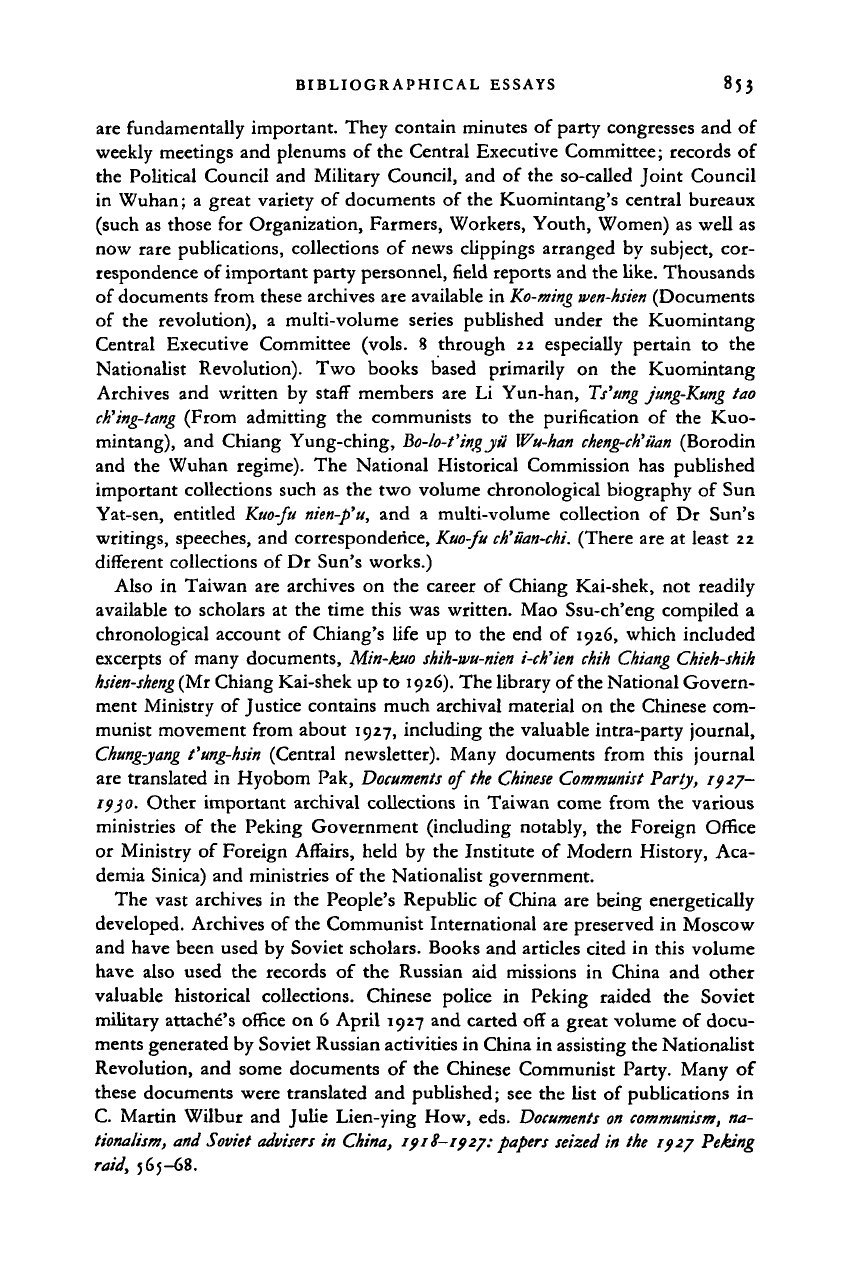
BIBLIOGRAPHICAL ESSAYS 853
are fundamentally important. They contain minutes of party congresses and of
weekly meetings and plenums of the Central Executive Committee; records of
the Political Council and Military Council, and of the so-called Joint Council
in Wuhan; a great variety of documents of the Kuomintang's central bureaux
(such as those for Organization, Farmers, Workers, Youth, Women) as well as
now rare publications, collections of news clippings arranged by subject, cor-
respondence of important party personnel, field reports and the like. Thousands
of documents from these archives are available in
Ko-ming wen-hsien
(Documents
of the revolution), a multi-volume series published under the Kuomintang
Central Executive Committee (vols. 8 through 22 especially pertain to the
Nationalist Revolution). Two books based primarily on the Kuomintang
Archives and written by staff members are Li Yun-han,
Ts'ung jung-Kung
tao
ch'ing-tang
(From admitting the communists to the purification of the Kuo-
mintang), and Chiang Yung-ching, Bo-lo-t'ingjii
Wu-han cheng-ch'uan
(Borodin
and the Wuhan regime). The National Historical Commission has published
important collections such as the two volume chronological biography of Sun
Yat-sen, entitled Kuo-fu
nien-p'u,
and a multi-volume collection of Dr Sun's
writings, speeches, and correspondence,
Kuo-fu
ch'uan-chi.
(There are at least 22
different collections of Dr Sun's works.)
Also in Taiwan are archives on the career of Chiang Kai-shek, not readily
available to scholars at the time this was written. Mao Ssu-ch'eng compiled a
chronological account of Chiang's life up to the end of 1926, which included
excerpts of many documents, Min-kuo shih-wu-nien i-ch'ien chih Chiang Chieh-shih
hsien-sheng
(Mi Chiang Kai-shek up to 1926). The library of the National Govern-
ment Ministry of Justice contains much archival material on the Chinese com-
munist movement from about 1927, including the valuable intra-party journal,
Chung-yang
t'ung-hsin
(Central newsletter). Many documents from this journal
are translated in Hyobom Pak, Documents of the Chinese Communist Party, 1927-
1930. Other important archival collections in Taiwan come from the various
ministries of the Peking Government (including notably, the Foreign Office
or Ministry of Foreign Affairs, held by the Institute of Modern History, Aca-
demia Sinica) and ministries of the Nationalist government.
The vast archives in the People's Republic of China are being energetically
developed. Archives of the Communist International are preserved in Moscow
and have been used by Soviet scholars. Books and articles cited in this volume
have also used the records of the Russian aid missions in China and other
valuable historical collections. Chinese police in Peking raided the Soviet
military attache's office on 6 April 1927 and carted off a great volume of docu-
ments generated by Soviet Russian activities in China in assisting the Nationalist
Revolution, and some documents of the Chinese Communist Party. Many of
these documents were translated and published; see the list of publications in
C. Martin Wilbur and Julie Lien-ying How, eds.
Documents
on
communism,
na-
tionalism, and Soviet advisers in China, 1918-1927: papers seized in the 192J Peking
raid,
565-68.
Cambridge Histories Online © Cambridge University Press, 2008
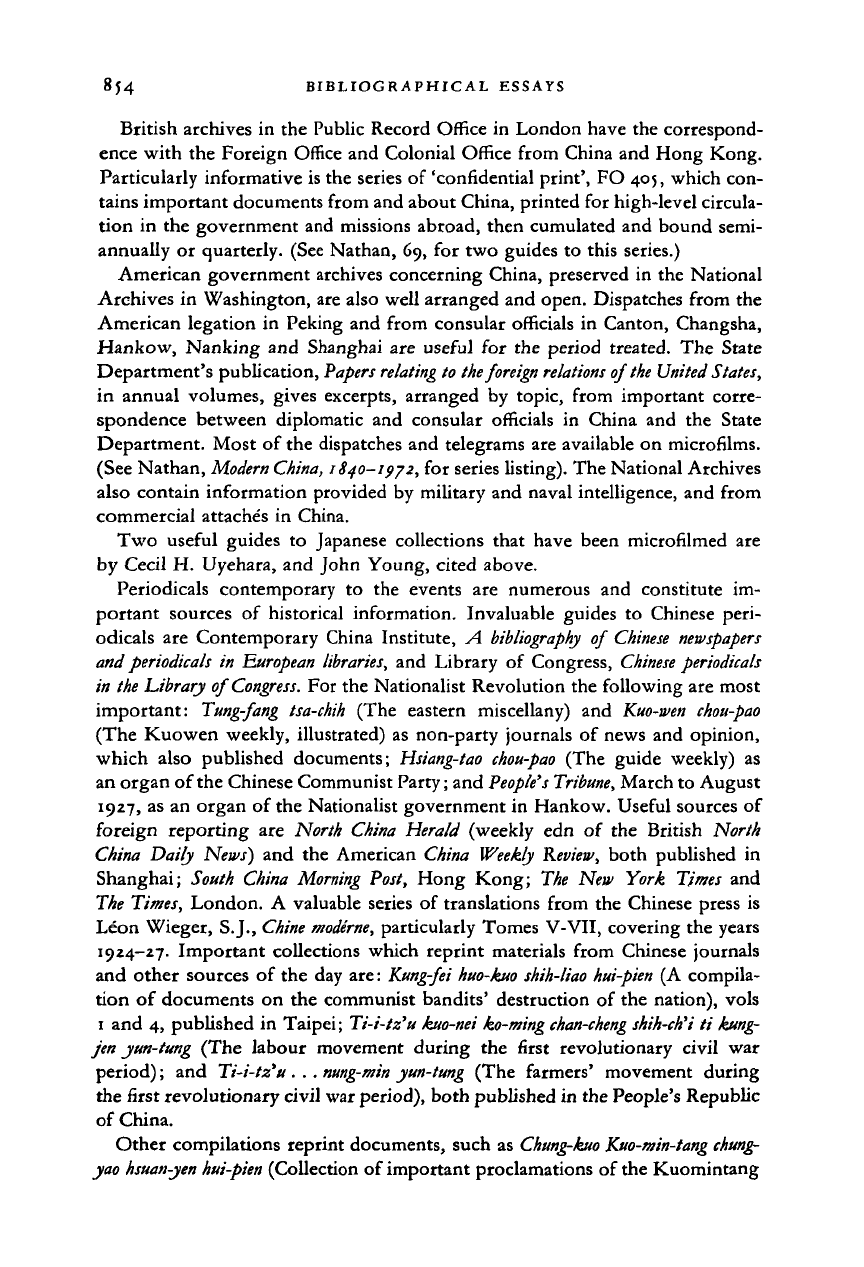
854 BIBLIOGRAPHICAL ESSAYS
British archives in the Public Record Office in London have the correspond-
ence with the Foreign Office and Colonial Office from China and Hong Kong.
Particularly informative is the series of 'confidential print', FO 405, which con-
tains important documents from and about China, printed for high-level circula-
tion in the government and missions abroad, then cumulated and bound semi-
annually or quarterly. (See Nathan, 69, for two guides to this series.)
American government archives concerning China, preserved in the National
Archives in Washington, are also well arranged and open. Dispatches from the
American legation in Peking and from consular officials in Canton, Changsha,
Hankow, Nanking and Shanghai are useful for the period treated. The State
Department's publication,
Papers relating
to the
foreign relations
of
the United
States,
in annual volumes, gives excerpts, arranged by topic, from important corre-
spondence between diplomatic and consular officials in China and the State
Department. Most of the dispatches and telegrams are available on microfilms.
(See Nathan,
Modern
China,
1840-1972, for series listing). The National Archives
also contain information provided by military and naval intelligence, and from
commercial attaches in China.
Two useful guides to Japanese collections that have been microfilmed are
by Cecil H. Uyehara, and John Young, cited above.
Periodicals contemporary to the events are numerous and constitute im-
portant sources of historical information. Invaluable guides to Chinese peri-
odicals are Contemporary China Institute, A
bibliography
of
Chinese newspapers
and periodicals
in
European
libraries,
and Library of Congress,
Chinese periodicals
in
the
Library of
Congress.
For the Nationalist Revolution the following are most
important: Tung-fang
tsa-chih
(The eastern miscellany) and
Kuo-wen chou-pao
(The Kuowen weekly, illustrated) as non-party journals of news and opinion,
which also published documents; Hsiang-tao
chou-pao
(The guide weekly) as
an organ of the Chinese Communist Party; and
People's
Tribune,
March to August
1927,
as an organ of the Nationalist government in Hankow. Useful sources of
foreign reporting are North China Herald (weekly edn of the British North
China Daily News) and the American China Weekly
Review,
both published in
Shanghai; South China
Morning
Post, Hong Kong; The New York Times and
The Times, London. A valuable series of translations from the Chinese press is
Leon Wieger, S.J.,
Chine
moderne,
particularly Tomes V-VII, covering the years
1924-27. Important collections which reprint materials from Chinese journals
and other sources of the day are:
Kung-fei huo-kuo shih-liao hui-pien
(A compila-
tion of documents on the communist bandits' destruction of the nation), vols
1 and 4, published in Taipei; Ti-i-tz'u
kuo-nei ko-ming chan-cheng shih-ch'i
ti
kung-
jen yun-tung (The labour movement during the first revolutionary civil war
period); and Ti-i-tz'u. . .
nung-min
yun-tung (The farmers' movement during
the first revolutionary civil war period), both published in the People's Republic
of China.
Other compilations reprint documents, such as
Chung-kuo Kuo-min-tang
chung-
yao
hsuan-yen hui-pien
(Collection of important proclamations of the Kuomintang
Cambridge Histories Online © Cambridge University Press, 2008
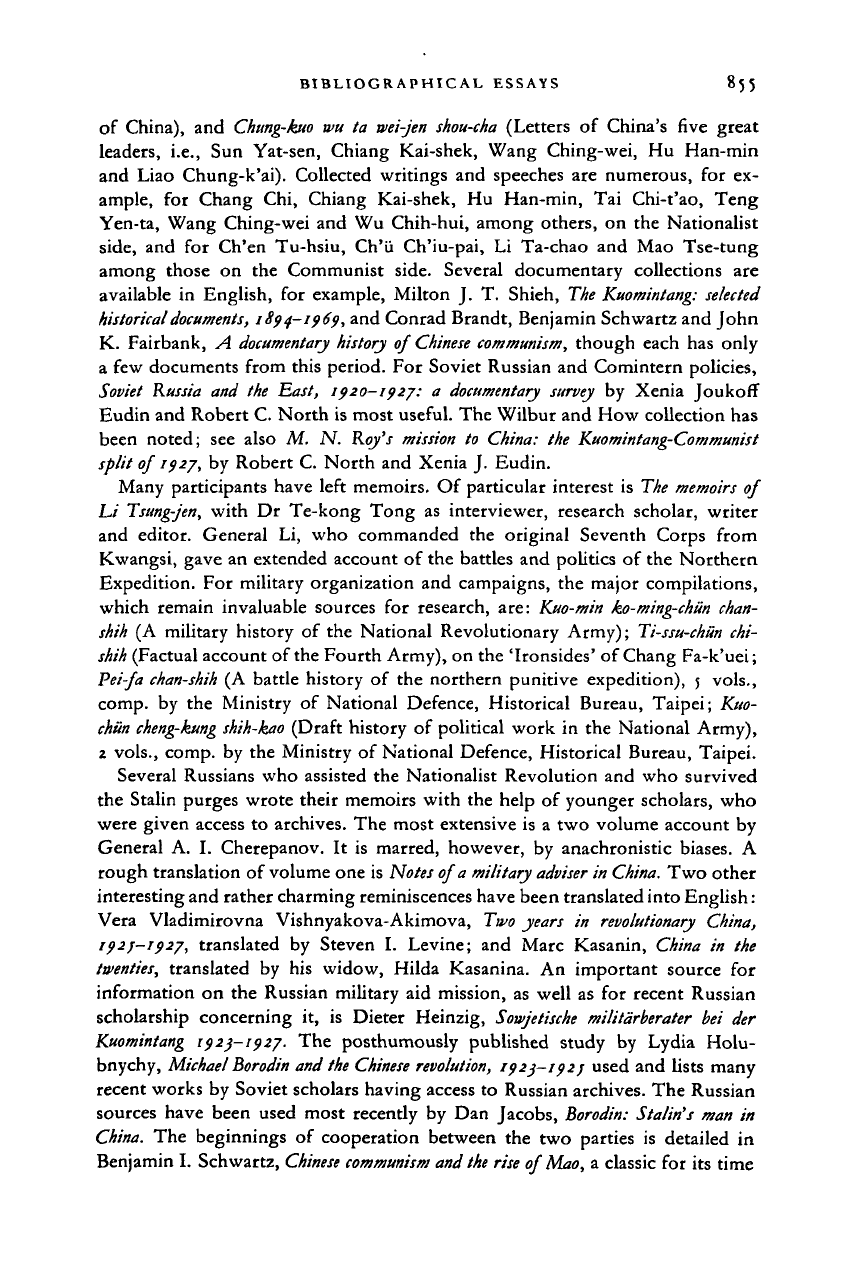
BIBLIOGRAPHICAL ESSAYS 855
of China), and
Chung-kuo
wit ta
wei-jen shou-cha
(Letters of China's five great
leaders, i.e., Sun Yat-sen, Chiang Kai-shek, Wang Ching-wei, Hu Han-min
and Liao Chung-k'ai). Collected writings and speeches are numerous, for ex-
ample, for Chang Chi, Chiang Kai-shek, Hu Han-min, Tai Chi-t'ao, Teng
Yen-ta, Wang Ching-wei and Wu Chih-hui, among others, on the Nationalist
side,
and for Ch'en Tu-hsiu, Ch'ii Ch'iu-pai, Li Ta-chao and Mao Tse-tung
among those on the Communist side. Several documentary collections are
available in English, for example, Milton J. T. Shieh, The
Kuomintang:
selected
historical
documents,
1894-1969, and Conrad Brandt, Benjamin Schwartz and John
K. Fairbank, A
documentary history
of
Chinese
communism,
though each has only
a few documents from this period. For Soviet Russian and Comintern policies,
Soviet Russia and the East, 1920-1927: a documentary survey by Xenia Joukoff
Eudin and Robert C. North is most useful. The Wilbur and How collection has
been noted; see also M. N. Roy's mission to China: the Kuomintang-Communist
split of
1927,
by Robert C. North and Xenia J. Eudin.
Many participants have left memoirs. Of particular interest is The
memoirs
of
'Li
Tsung-jen,
with Dr Te-kong Tong as interviewer, research scholar, writer
and editor. General Li, who commanded the original Seventh Corps from
Kwangsi, gave an extended account of the battles and politics of the Northern
Expedition. For military organization and campaigns, the major compilations,
which remain invaluable sources for research, are:
Kuo-min ko-ming-chun
chan-
shih (A military history of the National Revolutionary Army);
Ti-ssu-chiin
chi-
shih
(Factual account of the Fourth Army), on the 'Ironsides' of Chang Fa-k'uei;
Pei-fa
chan-shih
(A battle history of the northern punitive expedition), 5 vols.,
comp.
by the Ministry of National Defence, Historical Bureau, Taipei; Kuo-
chiln cheng-kung shih-kao
(Draft history of political work in the National Army),
2 vols., comp. by the Ministry of National Defence, Historical Bureau, Taipei.
Several Russians who assisted the Nationalist Revolution and who survived
the Stalin purges wrote their memoirs with the help of younger scholars, who
were given access to archives. The most extensive is a two volume account by
General A. I. Cherepanov. It is marred, however, by anachronistic biases. A
rough translation of volume one is Notes of a
military adviser
in
China.
Two other
interesting and rather charming reminiscences have been translated into English:
Vera Vladimirovna Vishnyakova-Akimova, Two years in
revolutionary
China,
ip2j-rp27, translated by Steven I. Levine; and Marc Kasanin, China in the
twenties, translated by his widow, Hilda Kasanina. An important source for
information on the Russian military aid mission, as well as for recent Russian
scholarship concerning it, is Dieter Heinzig,
Sowjetische militarberater
bei der
Kuomintang 1923-192J. The posthumously published study by Lydia Holu-
bnychy, Michael
Borodin
and the Chinese revolution, 1923-192; used and lists many
recent works by Soviet scholars having access to Russian archives. The Russian
sources have been used most recently by Dan Jacobs,
Borodin:
Stalin's man in
China. The beginnings of cooperation between the two parties is detailed in
Benjamin I. Schwartz,
Chinese communism and the rise
of
Mao,
a classic for its time
Cambridge Histories Online © Cambridge University Press, 2008
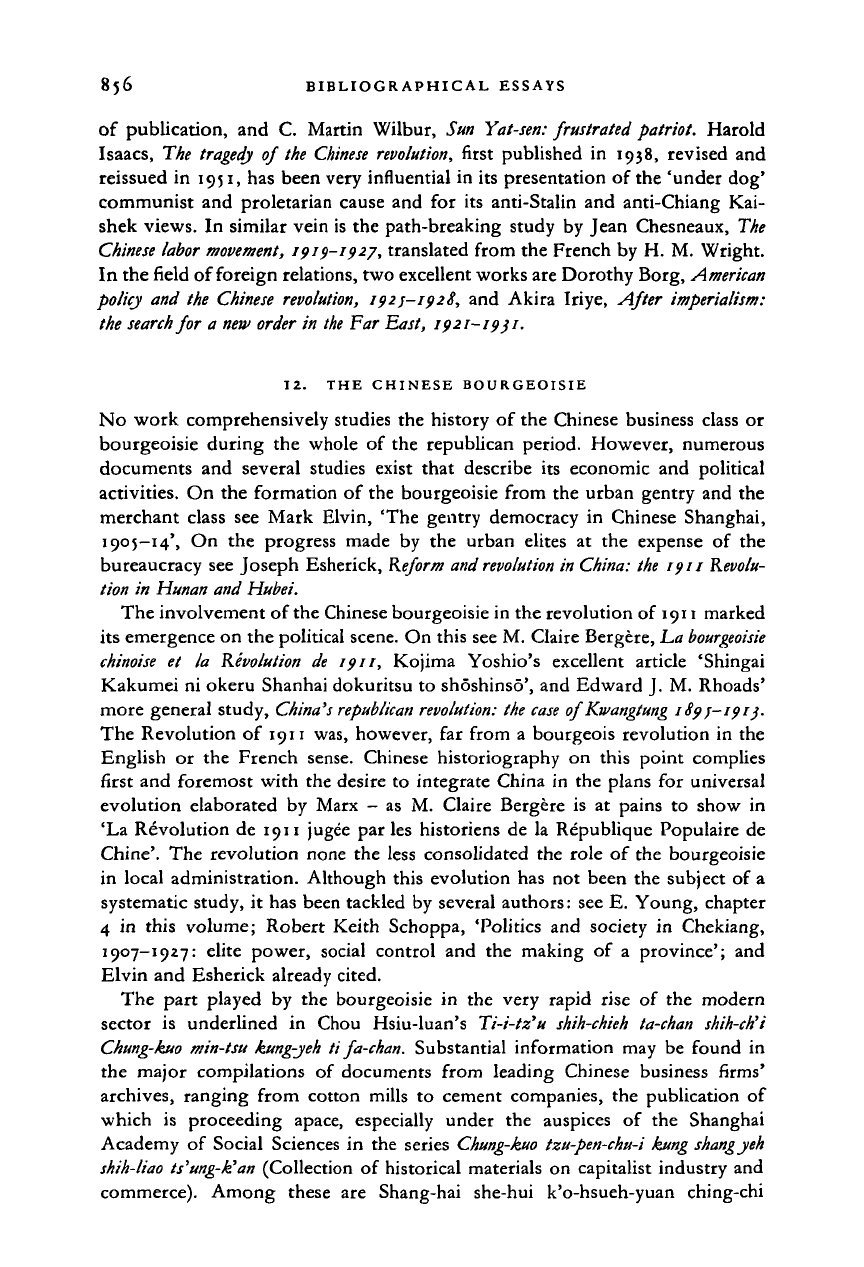
856 BIBLIOGRAPHICAL ESSAYS
of publication, and C. Martin Wilbur, Sun
Yat-sen:
frustrated patriot. Harold
Isaacs, The
tragedy
of
the Chinese
revolution,
first published in 1938, revised and
reissued in 1951, has been very influential in its presentation of the 'under dog'
communist and proletarian cause and for its anti-Stalin and anti-Chiang Kai-
shek views. In similar vein is the path-breaking study by Jean Chesneaux, The
Chinese labor
movement,
1919-1927, translated from the French by H. M. Wright.
In the field of foreign relations, two excellent works are Dorothy Borg, American
policy and the
Chinese
revolution,
192J-1928, and Akira Iriye, After
imperialism:
the search for a
new order
in
the
Far East, 1921-19)1.
12.
THE CHINESE BOURGEOISIE
No work comprehensively studies the history of the Chinese business class or
bourgeoisie during the whole of the republican period. However, numerous
documents and several studies exist that describe its economic and political
activities. On the formation of the bourgeoisie from the urban gentry and the
merchant class see Mark Elvin, 'The gentry democracy in Chinese Shanghai,
1905—14', On the progress made by the urban elites at the expense of the
bureaucracy see Joseph Esherick, Reform
and revolution
in
China:
the 1911
Revolu-
tion in Hunan and Hubei.
The involvement of the Chinese bourgeoisie in the revolution of
1911
marked
its emergence on the political scene. On this see M. Claire Bergere, La
bourgeoisie
chinoise
et la Revolution de 19it, Kojima Yoshio's excellent article 'Shingai
Kakumei ni okeru Shanhai dokuritsu to shoshinso', and Edward J. M. Rhoads'
more general study,
China's republican
revolution:
the
case
of
Kwangtung
189J-191).
The Revolution of 1911 was, however, far from a bourgeois revolution in the
English or the French sense. Chinese historiography on this point complies
first and foremost with the desire to integrate China in the plans for universal
evolution elaborated by Marx - as M. Claire Bergere is at pains to show in
'La Revolution de 1911 jugee par les historiens de la Republique Populaire de
Chine'. The revolution none the less consolidated the role of the bourgeoisie
in local administration. Although this evolution has not been the subject of a
systematic study, it has been tackled by several authors: see E. Young, chapter
4 in this volume; Robert Keith Schoppa, 'Politics and society in Chekiang,
1907-1927: elite power, social control and the making of a province'; and
Elvin and Esherick already cited.
The part played by the bourgeoisie in the very rapid rise of the modern
sector is underlined in Chou Hsiu-luan's Ti-i-tz'u
shih-chieh
ta-chan shih-ch'i
Chung-kuo
min-tsu kung-jeh ti fa-chan. Substantial information may be found in
the major compilations of documents from leading Chinese business firms'
archives, ranging from cotton mills to cement companies, the publication of
which is proceeding apace, especially under the auspices of the Shanghai
Academy of Social Sciences in the series
Chung-kuo tzu-pen-chu-i
kung
shangyeh
shih-liao
ts'ung-k'an (Collection of historical materials on capitalist industry and
commerce). Among these are Shang-hai she-hui k'o-hsueh-yuan ching-chi
Cambridge Histories Online © Cambridge University Press, 2008
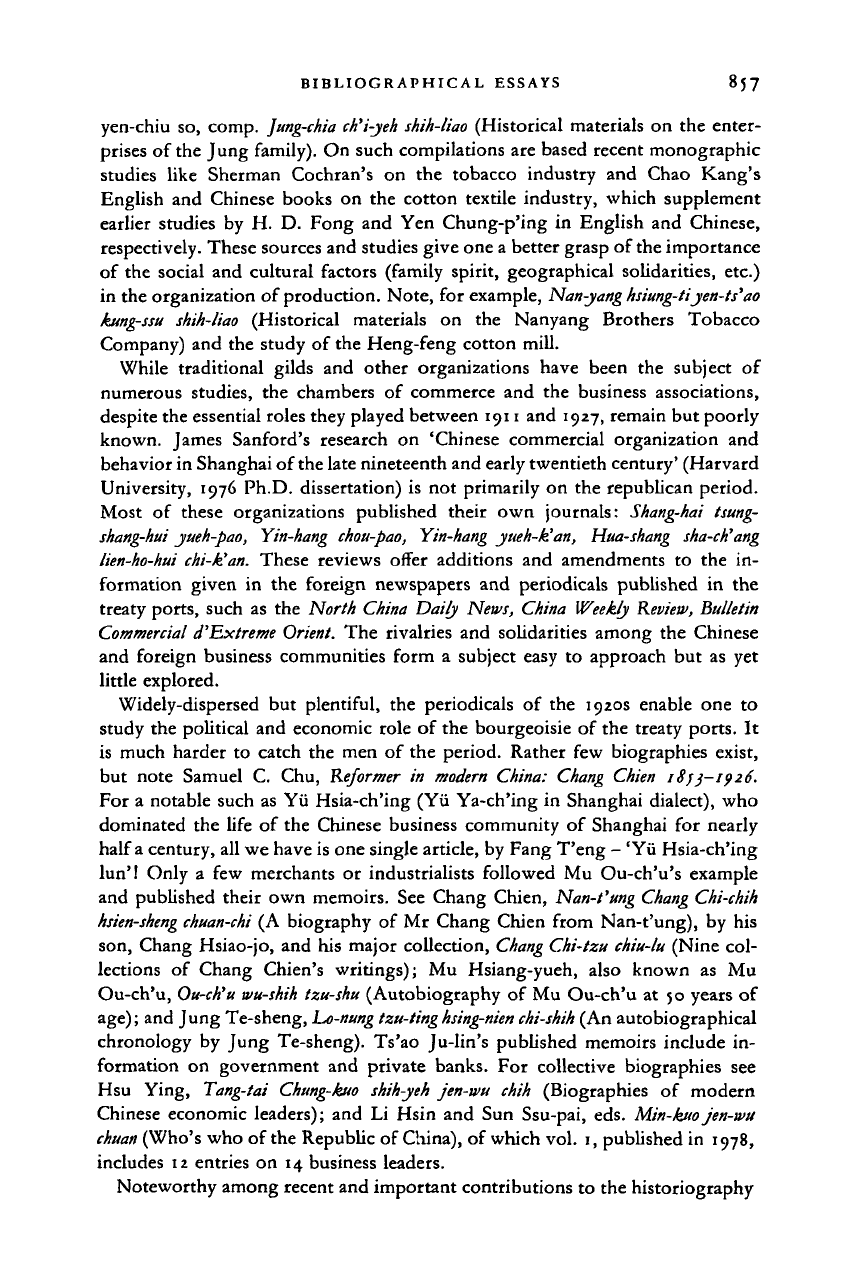
BIBLIOGRAPHICAL ESSAYS 857
yen-chiu so, comp.
Jung-chia ch'i-yeh shih-liao
(Historical materials on the enter-
prises of the Jung family). On such compilations are based recent monographic
studies like Sherman Cochran's on the tobacco industry and Chao Kang's
English and Chinese books on the cotton textile industry, which supplement
earlier studies by H. D. Fong and Yen Chung-p'ing in English and Chinese,
respectively. These sources and studies give one a better grasp of the importance
of the social and cultural factors (family spirit, geographical solidarities, etc.)
in the organization of production. Note, for example,
Nan-yang
hsiung-ti yen-ts' ao
kung-ssu shih-liao (Historical materials on the Nanyang Brothers Tobacco
Company) and the study of the Heng-feng cotton mill.
While traditional gilds and other organizations have been the subject of
numerous studies, the chambers of commerce and the business associations,
despite the essential roles they played between 1911 and 1927, remain but poorly
known. James Sanford's research on 'Chinese commercial organization and
behavior in Shanghai of the late nineteenth and early twentieth century' (Harvard
University, 1976 Ph.D. dissertation) is not primarily on the republican period.
Most of these organizations published their own journals: Shang-hai tsung-
shang-hui yueh-pao, Yin-hang chou-pao, Yin-hang yueh-k'an, Hua-shang sha-ch'ang
lien-ho-hui
chi-k'an.
These reviews offer additions and amendments to the in-
formation given in the foreign newspapers and periodicals published in the
treaty ports, such as the North
China
Daily News, China Weekly
Review,
Bulletin
Commercial
d'Extreme
Orient.
The rivalries and solidarities among the Chinese
and foreign business communities form a subject easy to approach but as yet
little explored.
Widely-dispersed but plentiful, the periodicals of the 1920s enable one to
study the political and economic role of the bourgeoisie of the treaty ports. It
is much harder to catch the men of the period. Rather few biographies exist,
but note Samuel C. Chu, Reformer in
modern
China:
Chang
Chien 18^-1926.
For a notable such as Yu Hsia-ch'ing (Yii Ya-ch'ing in Shanghai dialect), who
dominated the life of the Chinese business community of Shanghai for nearly
half
a
century, all we have is one single article, by Fang T'eng - ' Yu Hsia-ch'ing
lun'! Only a few merchants or industrialists followed Mu Ou-ch'u's example
and published their own memoirs. See Chang Chien, Nan-t'ung
Chang Chi-chih
hsien-sheng chuan-chi
(A biography of Mr Chang Chien from Nan-t'ung), by his
son, Chang Hsiao-jo, and his major collection,
Chang
Chi-tzu
chiu-lu
(Nine col-
lections of Chang Chien's writings); Mu Hsiang-yueh, also known as Mu
Ou-ch'u,
Ou-ch'u wu-shih
tzu-shu (Autobiography of Mu Ou-ch'u at 50 years of
age);
and Jung Te-sheng,
Lo-nung tzu-tinghsing-nien chi-shih
(An autobiographical
chronology by Jung Te-sheng). Ts'ao Ju-lin's published memoirs include in-
formation on government and private banks. For collective biographies see
Hsu Ying, Tang-tai
Chung-kuo shih-yeh
jen-rvu chih (Biographies of modern
Chinese economic leaders); and Li Hsin and Sun Ssu-pai, eds. Min-kuo jen-wu
chuan
(Who's who of the Republic of
China),
of which vol. 1, published in 1978,
includes 12 entries on 14 business leaders.
Noteworthy among recent and important contributions to the historiography
Cambridge Histories Online © Cambridge University Press, 2008
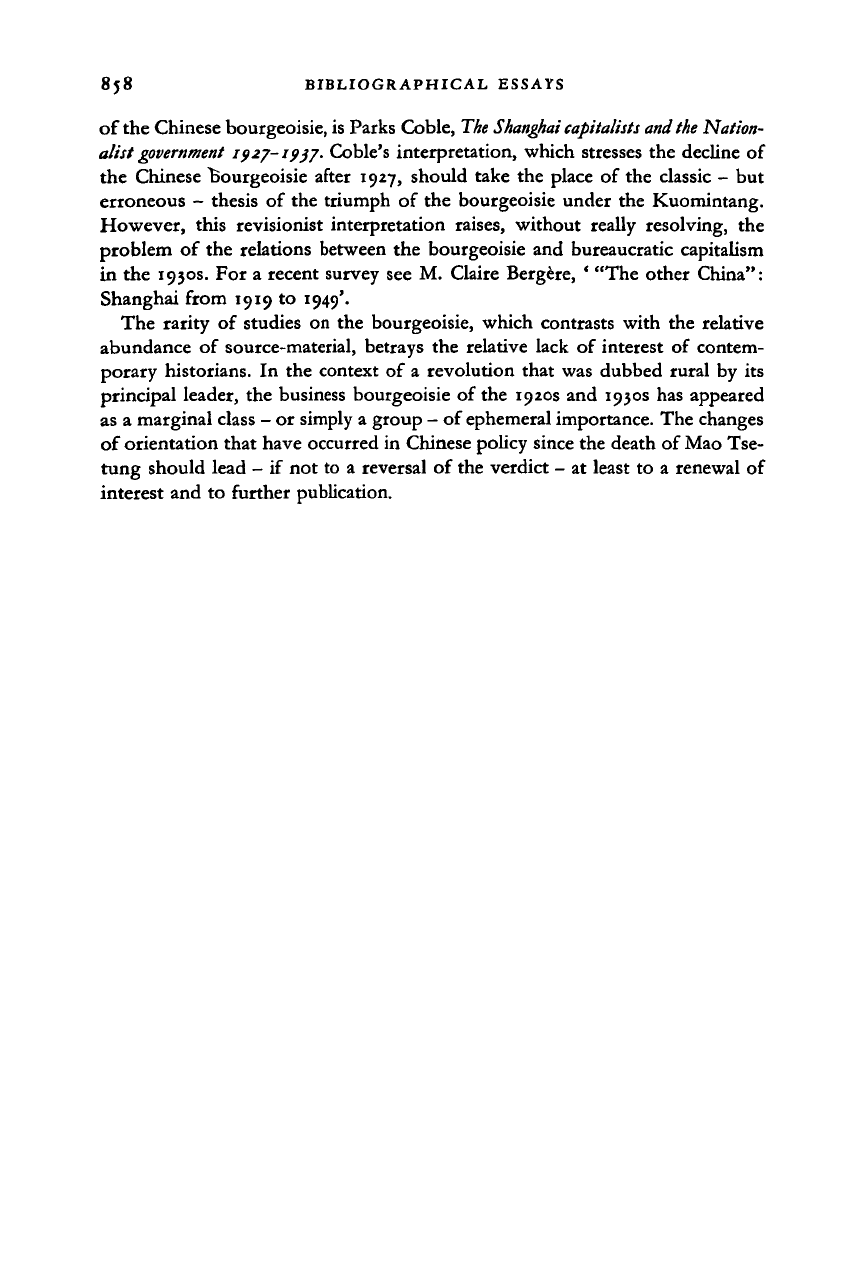
858 BIBLIOGRAPHICAL ESSAYS
of the Chinese bourgeoisie, is Parks Coble,
The Shanghai capitalists and the
Nation-
alist
government
1927-19}?. Coble's interpretation, which stresses the decline of
the Chinese bourgeoisie after 1927, should take the place of the classic - but
erroneous - thesis of the triumph of the bourgeoisie under the Kuomintang.
However, this revisionist interpretation raises, without really resolving, the
problem of the relations between the bourgeoisie and bureaucratic capitalism
in the 1930s. For a recent survey see M. Claire Bergere, ' "The other China":
Shanghai from 1919 to 1949'.
The rarity of studies on the bourgeoisie, which contrasts with the relative
abundance of source-material, betrays the relative lack of interest of contem-
porary historians. In the context of a revolution that was dubbed rural by its
principal leader, the business bourgeoisie of the 1920s and 1930s has appeared
as a marginal class - or simply a group - of ephemeral importance. The changes
of orientation that have occurred in Chinese policy since the death of Mao Tse-
tung should lead - if not to a reversal of the verdict - at least to a renewal of
interest and to further publication.
Cambridge Histories Online © Cambridge University Press, 2008
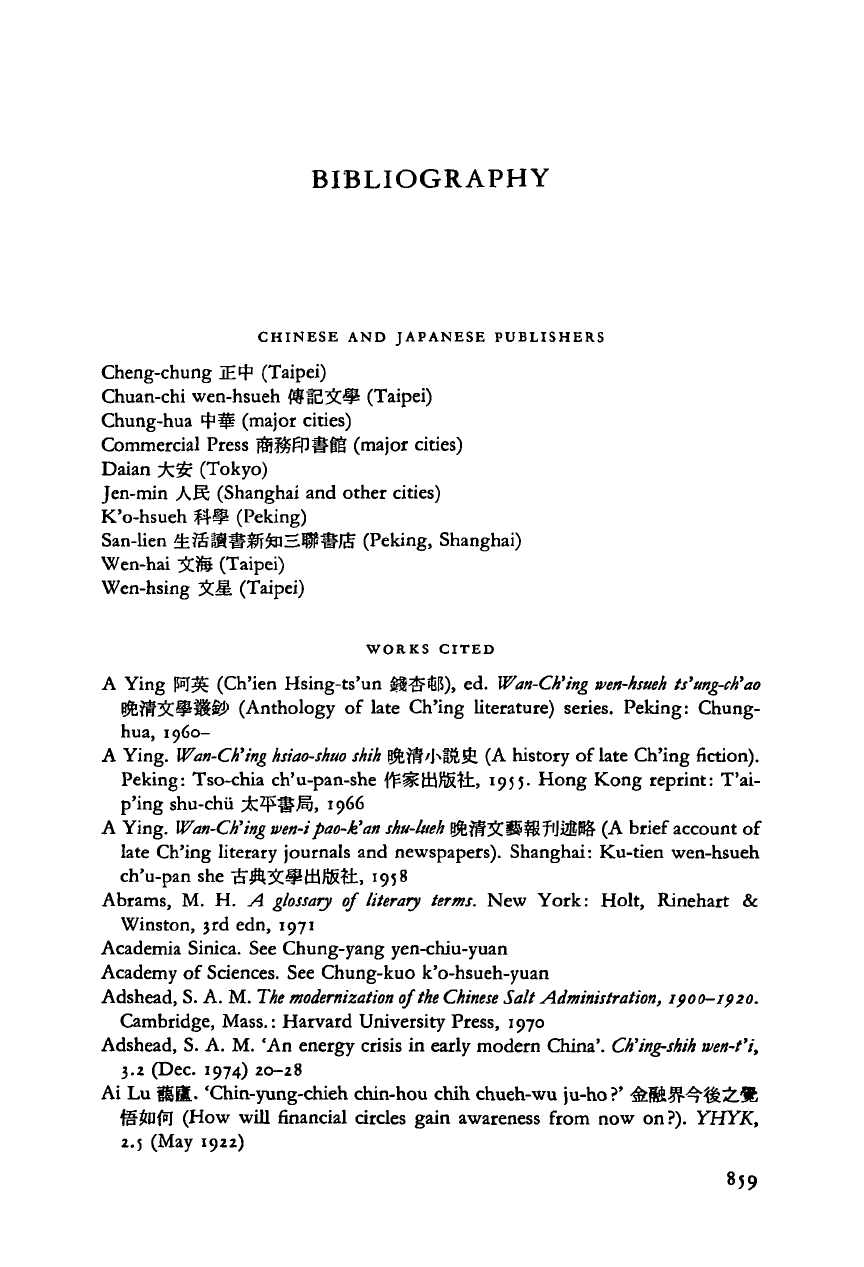
BIBLIOGRAPHY
CHINESE AND JAPANESE PUBLISHERS
Cheng-chung JE4
1
(Taipei)
Chuan-chi wen-hsueh
ff
|E30P (Taipei)
Chung-hua
4
1
?
(major cities)
Commercial Press #8$SI=f)||fi! (major cities)
Daian
jz.%
(Tokyo)
Jen-min
AS
(Shanghai
and
other cities)
K'o-hsueh ipHP (Peking)
San-lien £S^#fr£nHI8f#j£ (Peking, Shanghai)
Wen-hai
SCM
(Taipei)
Wen-hsing
3CM.
(Taipei)
WORKS CITED
A Ying
H^
(Ch'ien Hsing-ts'un Hi!?®),
ed.
Wan-Ch'ing wen-hsueh ts'ung-ch'ao
§fc?#2£Piil£!> (Anthology
of
late Ch'ing literature) series. Peking: Chung-
hua,
1960-
A Ying.
Wan-Ch'ing hsiao-shuo shih
ifeflf 'Mftit
(A
history
of
late Ch'ing fiction).
Peking: Tso-chia ch'u-pan-she f^l^fcHJiKtt, 1955. Hong Kong reprint:
T'ai-
p'ing shu-chu %T^%Wi,
1966
A Ying.
Wan-Ch'ing
wen-i pao-k'an
shu-lueh
gfeff
3CBWlTiMtt&
(A
brief account
of
late Ch'ing literary journals
and
newspapers). Shanghai: Ku-tien wen-hsueh
ch'u-pan
she
S&Xm&Mi.,
1958
Abrams,
M. H. A
glossary
of
literary
terms.
New
York: Holt, Rinehart
&
Winston,
3rd edn, 1971
Academia Sinica.
See
Chung-yang yen-chiu-yuan
Academy
of
Sciences.
See
Chung-kuo k'o-hsueh-yuan
Adshead, S. A.
M.
The modernization
of
the Chinese
Salt
Administration,
1900-19 20.
Cambridge, Mass.: Harvard University Press,
1970
Adshead,
S. A. M. 'An
energy crisis
in
early modern China'.
Ch'ing-shih
wen-t'i,
3.2 (Dec. 1974) 20-28
Ai
Lu
g&ffi. 'Chin-yung-chieh chin-hou chih chueh-wu ju-ho?' &MR^%.iL%
fa#0{5J
(How
will financial circles gain awareness from
now on?).
YHYK,
2.5
(May 1922)
859
Cambridge Histories Online © Cambridge University Press, 2008
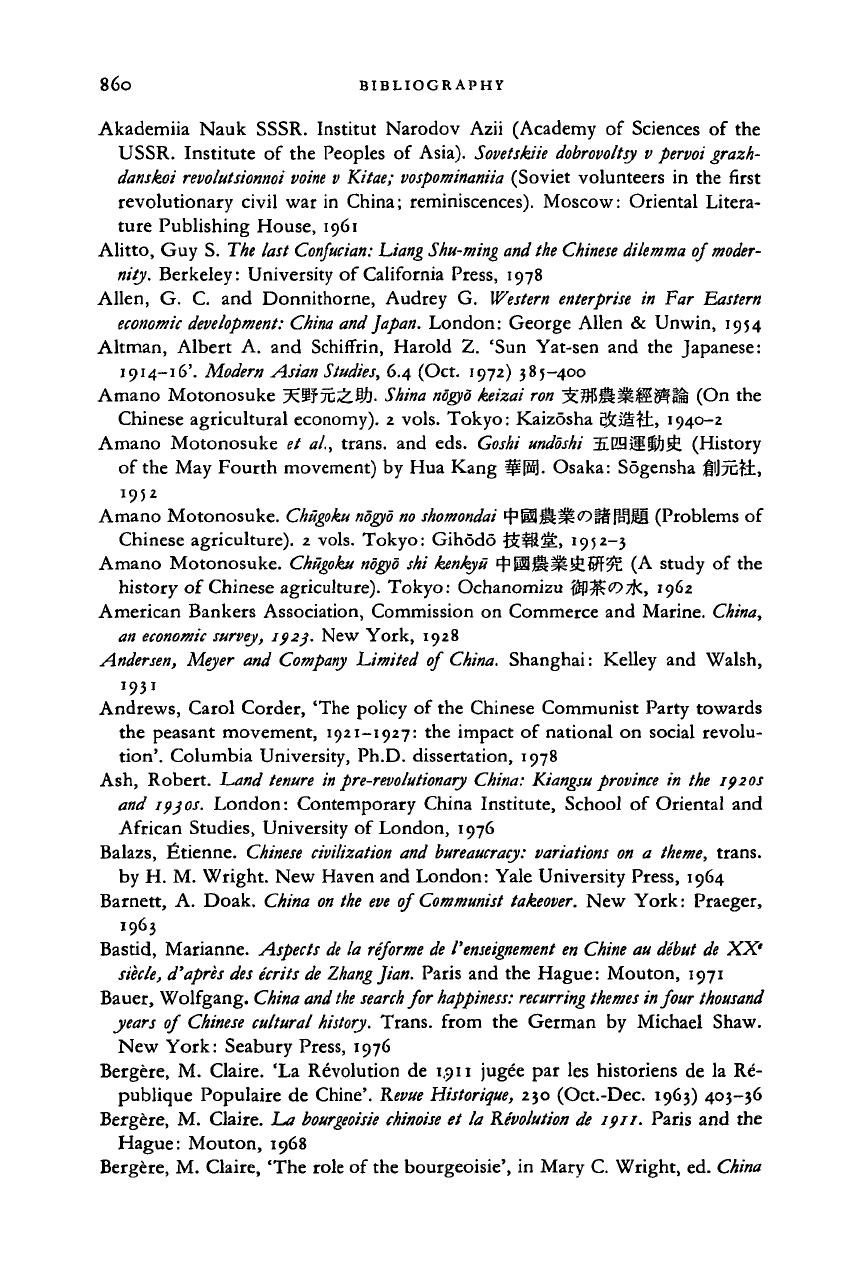
860 BIBLIOGRAPHY
Akademiia Nauk SSSR. Institut Narodov Azii (Academy of Sciences of the
USSR. Institute of the Peoples of Asia).
Sovetskiie dobrovoltsy
v
pervoi
grazh-
danskoi
revolutsionnoi voine
v Kitae;
vospominaniia
(Soviet volunteers in the first
revolutionary civil war in China; reminiscences). Moscow: Oriental Litera-
ture Publishing House, 1961
Alitto, Guy S. The last
Confucian:
Liang
Shu-ming and the Chinese dilemma
of
moder-
nity, Berkeley: University of California Press, 1978
Allen, G. C. and Donnithorne, Audrey G. Western
enterprise
in Far Eastern
economic
development:
China and
fapan.
London: George Allen & Unwin, 1954
Altman, Albert A. and Schiffrin, Harold Z. 'Sun Yat-sen and the Japanese:
1914-16'.
Modern
Asian
Studies,
6.4 (Oct. 1972) 385-400
Amano Motonosuke ^If7c;£.l<b.
Shina nogya
keizai
ron
;£#|$Ii SI
$?$?!§!
(On the
Chinese agricultural economy). 2 vols. Tokyo: Kaizosha gfciSlfcfc, 1940-2
Amano Motonosuke et al., trans, and eds. Goshi
undbshi
SCEIjlijRjStl (History
of the May Fourth movement) by Hua Kang ^K!. Osaka: Sogensha flj7c|±,
1952
Amano Motonosuke.
Chugoku nogyo no shomondai
tflHIJISIWiNf (SSI (Problems of
Chinese agriculture). 2 vols. Tokyo: Gihodo t$$8;e", 1952-3
Amano Motonosuke.
Chugoku nogyo
shi kenkyu
*PWIiikM£l%ft$i.
(A study of the
history of Chinese agriculture). Tokyo: Ochanomizu $P$JCOTK, 1962
American Bankers Association, Commission on Commerce and Marine. China,
an
economic
survey,
1923. New York, 1928
Andersen, Meyer and
Company
Limited of
China.
Shanghai: Kelley and Walsh,
1931
Andrews, Carol Corder, 'The policy of the Chinese Communist Party towards
the peasant movement, 1921-1927: the impact of national on social revolu-
tion'. Columbia University, Ph.D. dissertation, 1978
Ash, Robert. Land
tenure in pre-revolutionary
China:
Kiangsu province
in the 1920s
and ipjos. London: Contemporary China Institute, School of Oriental and
African Studies, University of London, 1976
Balazs, fitienne.
Chinese civilization
and
bureaucracy:
variations
on a theme, trans,
by H. M. Wright. New Haven and London: Yale University Press, 1964
Barnett, A. Doak, China
on
the
eve
of
Communist
takeover.
New York: Praeger,
1963
Bastid, Marianne. Aspects
de
la
reforme de
I'enseignement
en
Chine
au
debut
de XX'
siicle,
d'apres
des
e'crits
de Zhang
Jian.
Paris and the Hague: Mouton, 1971
Bauer, Wolfgang.
China and the search
for
happiness:
recurring themes
in four
thousand
years of
Chinese
cultural
history.
Trans, from the German by Michael Shaw.
New York: Seabury Press, 1976
Bergere, M. Claire. 'La Revolution de 1,911 jugee par les historiens de la Re-
publique Populaire de Chine'.
Revue
Historique,
230 (Oct.-Dec. 1963) 403-36
Bergere, M. Claire. La
bourgeoisie chinoise
et la
Revolution
de ipzr. Paris and the
Hague: Mouton, 1968
Bergere, M. Claire, 'The role of the bourgeoisie', in Mary C. Wright, ed.
China
Cambridge Histories Online © Cambridge University Press, 2008
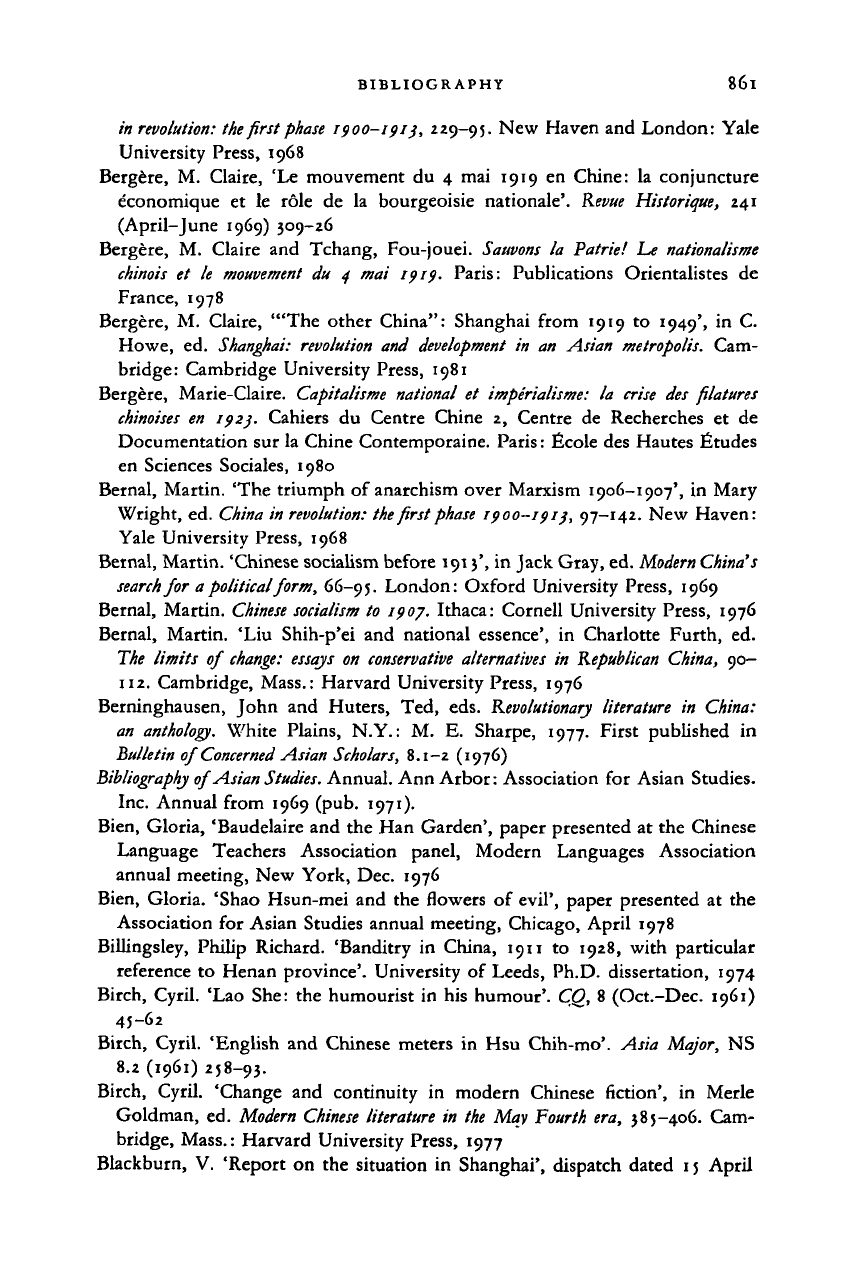
BIBLIOGRAPHY 86l
in
revolution:
the
first
phase 1900-191}, 229-95. New Haven and London: Yale
University Press, 1968
Bergere, M. Claire, 'Le mouvement du 4 mai 1919 en Chine: la conjuncture
economique et le role de la bourgeoisie nationale'. Revue Historique, 241
(April-June 1969) 309-26
Bergere, M. Claire and Tchang, Fou-jouei.
Sauvons
la Patrie! he
nationalisme
chinois
et le
mouvement
du 4 mai 1919. Paris: Publications Orientalistes de
France, 1978
Bergere, M. Claire, '"The other China": Shanghai from 1919 to 1949', in C.
Howe, ed.
Shanghai:
revolution
and
development
in an Asian
metropolis.
Cam-
bridge: Cambridge University Press, 1981
Bergere, Marie-Claire. Capitalisme national et
imperialisme:
la crise des filatures
chinoises
en 1923. Cahiers du Centre Chine 2, Centre de Recherches et de
Documentation sur la Chine Contemporaine. Paris: Ecole des Hautes Etudes
en Sciences Sociales, 1980
Bernal, Martin. 'The triumph of anarchism over Marxism 1906-1907', in Mary
Wright, ed.
China
in
revolution:
the
first
phase
1900-191), 97-142. New Haven:
Yale University Press, 1968
Bernal, Martin. 'Chinese socialism before
1913',
in Jack Gray, ed.
Modern China''s
search for
a
political
form,
66-95. London: Oxford University Press, 1969
Bernal, Martin.
Chinese socialism
to 190J. Ithaca: Cornell University Press, 1976
Bernal, Martin. 'Liu Shih-p'ei and national essence', in Charlotte Furth, ed.
The limits of
change:
essays on conservative alternatives in Republican China, 90-
112.
Cambridge, Mass.: Harvard University Press, 1976
Berninghausen, John and Huters, Ted, eds.
Revolutionary
literature in China:
an
anthology.
White Plains, N.Y.: M. E. Sharpe, 1977. First published in
Bulletin
of
Concerned
Asian
Scholars,
8.1-2 (1976)
Bibliography
of Asian
Studies.
Annual. Ann Arbor: Association for Asian Studies.
Inc.
Annual from 1969 (pub. 1971).
Bien, Gloria, 'Baudelaire and the Han Garden', paper presented at the Chinese
Language Teachers Association panel, Modern Languages Association
annual meeting, New York, Dec. 1976
Bien, Gloria. 'Shao Hsun-mei and the flowers of evil', paper presented at the
Association for Asian Studies annual meeting, Chicago, April 1978
Billingsley, Philip Richard. 'Banditry in China, 1911 to 1928, with particular
reference to Henan province'. University of Leeds, Ph.D. dissertation, 1974
Birch, Cyril. 'Lao She: the humourist in his humour'. CQ, 8 (Oct.-Dec. 1961)
45-62
Birch, Cyril. 'English and Chinese meters in Hsu Chih-mo'. Asia Major, NS
8.2 (1961) 258-93.
Birch, Cyril. 'Change and continuity in modern Chinese fiction', in Merle
Goldman, ed.
Modern Chinese literature
in the May Fourth era, 385-406. Cam-
bridge, Mass.: Harvard University Press, 1977
Blackburn, V. 'Report on the situation in Shanghai', dispatch dated 15 April
Cambridge Histories Online © Cambridge University Press, 2008
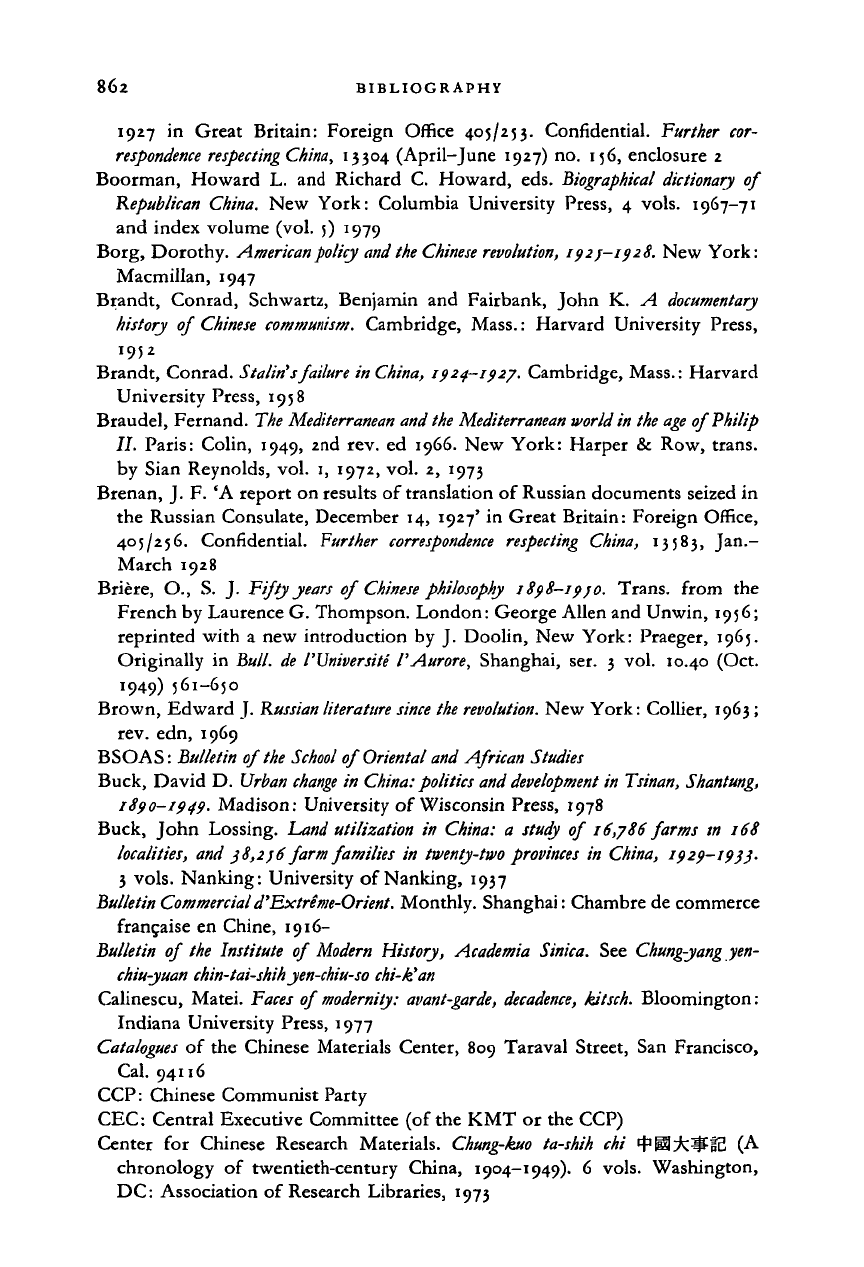
862 BIBLIOGRAPHY
1927 in Great Britain: Foreign Office 405/253. Confidential. Further cor-
respondence respecting
China,
13304 (April-June 1927) no. 156, enclosure 2
Boorman, Howard L. and Richard C. Howard, eds.
Biographical dictionary
of
Republican China. New York: Columbia University Press, 4 vols. 1967-71
and index volume (vol. 5) 1979
Borg, Dorothy.
American policy and the Chinese
revolution,
192/-1928. New York:
Macmillan, 1947
Brandt, Conrad, Schwartz, Benjamin and Fairbank, John K. A
documentary
history of
Chinese
communism.
Cambridge, Mass.: Harvard University Press,
1952
Brandt, Conrad. Stalin's failure in
China,
1924-1927. Cambridge, Mass.: Harvard
University Press, 1958
Braudel, Fernand. The
Mediterranean and the Mediterranean world in the age
of Philip
II. Paris: Colin, 1949, 2nd rev. ed 1966. New York: Harper & Row, trans.
by Sian Reynolds, vol. 1, 1972, vol. 2, 1973
Brenan, J. F. 'A report on results of translation of Russian documents seized in
the Russian Consulate, December 14, 1927' in Great Britain: Foreign Office,
405/256. Confidential. Further correspondence respecting China, 13583, Jan.-
March 1928
Briere, O., S. J. Fifty
years
of
Chinese philosophy
1898-19
jo.
Trans, from the
French by Laurence G. Thompson. London: George Allen and Unwin, 1956;
reprinted with a new introduction by J. Doolin, New York: Praeger, 1965.
Originally in Bull, de
I'Universite
I'Aurore, Shanghai, ser. 3 vol. 10.40 (Oct.
1949) 561-650
Brown, Edward J.
Russian literature since the
revolution.
New York: Collier, 1963 ;
rev. edn, 1969
BSOAS:
Bulletin
of
the School
of
Oriental and
African Studies
Buck, David D.
Urban change
in
China:
politics and development
in
Tsinan,
Shantung,
1890-1949. Madison: University of Wisconsin Press, 1978
Buck, John Lossing. Land utilization in China: a study of
16,786
farms m 168
localities,
and $8,2)6 farm families in
twenty-two provinces
in China, 1929-19}).
3 vols. Nanking: University of Nanking, 1937
Bulletin
Commerciald'Extreme-Orient.
Monthly. Shanghai: Chambre de commerce
franchise en Chine, 1916-
Bulletin of the Institute of
Modern
History, Academia Sinica. See
Chung-yang
yen-
chiu-yuan
chin-tai-shih
yen-chiu-so chi-k'an
Calinescu, Matei.
Faces
of
modernity:
avant-garde,
decadence,
kitsch. Bloomington:
Indiana University Press, 1977
Catalogues
of the Chinese Materials Center, 809 Taraval Street, San Francisco,
Cal. 94116
CCP:
Chinese Communist Party
CEC:
Central Executive Committee (of the KMT or the CCP)
Center for Chinese Research Materials. Chung-kuo ta-shih chi cpiSI^ljffE (A
chronology of twentieth-century China, 1904-1949). 6 vols. Washington,
DC:
Association of Research Libraries, 1973
Cambridge Histories Online © Cambridge University Press, 2008
